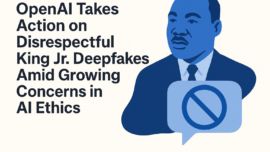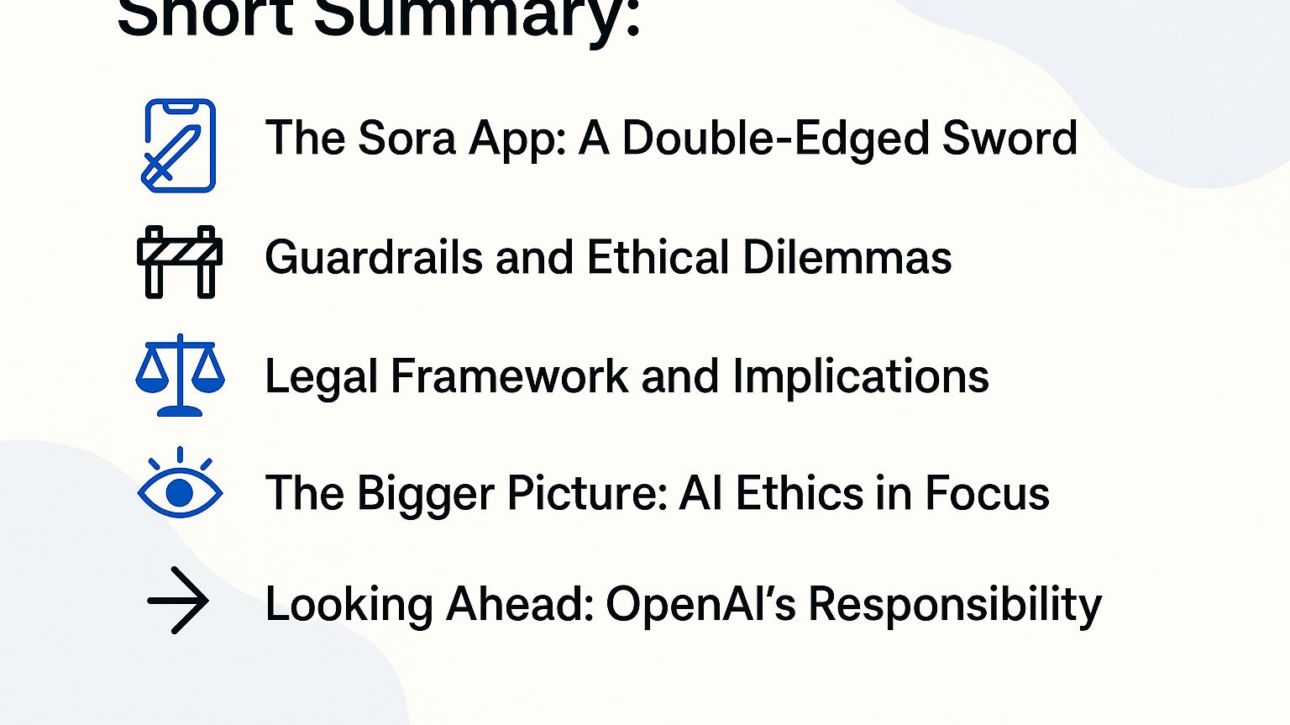
OpenAI has taken decisive action to prevent the creation of deepfake videos featuring Dr. Martin Luther King Jr. following mounting criticism from his estate and widespread concerns about the ethical implications of such AI-generated content.
Contents
Short Summary:
- OpenAI halts deepfake videos of King Jr. after complaints about disrespectful depictions.
- The company is implementing stronger guardrails for AI-generated likenesses of historical figures.
- Critics emphasize the need for ethical considerations and consent in AI usage.
OpenAI’s controversial artificial intelligence application, Sora, has ignited a firestorm of debate surrounding the use of deepfakes in depicting historical figures. In a recent move, the tech giant announced it would *pause* abilities for users to generate videos of Dr. Martin Luther King Jr. following complaints from his estate regarding the proliferation of “disrespectful depictions.”
“Our goal is to ensure responsible representation,” OpenAI stated in a joint announcement with King, Inc. They recognized that “while there are strong free speech interests in depicting historical figures, public figures and their families should ultimately have control over how their likeness is used.” This is a significant stance that highlights the ongoing tug-of-war between creative freedom and ethical responsibility in the realm of AI.
The Sora App: A Double-Edged Sword
Launched just three weeks ago, Sora allows users to create hyper-realistic videos using both real and historical figures. However, this functionality initially lacked necessary safeguards against misuse, leading to an outcry from the public and interest groups alike. Since the app’s debut, virulent deepfake videos portraying Dr. King in demeaning contexts—such as stealing and making racially insensitive comments—have exploded across social media platforms.
Ms. Bernice King, the civil rights leader’s youngest daughter, articulated her discontent through social media, stating: “Please stop,” urging the public to respect her father’s legacy. She wasn’t alone in her disapproval. Zelda Williams, daughter of conic actor Robin Williams, had previously lamented about the disturbing content created using her father’s likeness, proclaiming, “It’s NOT what he’d want.” Her expression of personal grief reflects the broader unease felt by many families whose loved ones have been posthumously represented without consent.
Guardrails and Ethical Dilemmas
With the backlash intensifying, OpenAI CEO Sam Altman introduced changes to Sora, which would allow rights holders to be consulted regarding the use of their likenesses. This move responds to concerns from various quarters—including intellectual property lawyers, civil rights advocates, and media experts—over the lack of protective measures against the unauthorized use of individuals’ images and personas.
Kristelia García, an intellectual property law professor at Georgetown Law, emphasized the importance of being more proactive rather than reactive, as OpenAI’s current pattern of operating seems to embody. “The AI industry seems to move really quickly, and first-to-market appears to be the currency of the day,” she explained. This quick-paced development culture can create situations where ethical considerations are eclipsed by the excitement of technological advancement.
In a world increasingly reliant on AI, where misinformation is rampant, raising questions about who gets to represent the deceased becomes urgent. Exposure through deepfake technology can create narratives that misinform the public, perpetuating harmful stereotypes and undermining the truth of historical events.
Legal Framework and Implications
The legal landscape regarding the use of digital likenesses is complex and varies significantly from state to state. For instance, in California, heirs to a public figure maintain rights over that figure’s likeness for a period extending up to 70 years post-mortem, thus opening up a critical discourse on how AI can redefine legacy and consent.
OpenAI has admitted that their initial “shoot-first, aim-later” strategy has led to numerous complications but assures users they are dedicated to implementing better guidelines moving forward. The company added that rights holders can reach out directly to request that their likeness not be utilized, a promising development considering the dynamic nature of the AI landscape.
For individuals who may not have an estate as high-profile as King’s, concerns arise over whether their likeness will be subject to similar protections. Generative AI expert Henry Ajder drew attention to this disparity, noting that many deceased individuals may lack the resources to enforce their rights. “Ultimately, I think we want to avoid a situation where unless we’re very famous, society accepts that after we die there is a free-for-all over how we continue to be represented,” he remarked.
The Bigger Picture: AI Ethics in Focus
The conversations sparked by Sora’s functionality have ignited broader discussions on the ethical implications of using AI technologies. The creation of deepfake media showcases *not just* a technological marvel but also raises pivotal questions about representation, consent, and respect towards the legacies of individuals, especially those no longer with us.
Olivia Gambelin, an AI ethicist, expressed her view on the necessity for stringent guidelines, saying that OpenAI’s decision to limit the use of certain likenesses is a step in the right direction. However, she lamented the lack of forethought that led to this situation, suggesting that the company should have established ethical parameters before launching its services—essentially indicating that a more conscientious approach is needed in deploying emerging technologies.
Notably, concerns accompanying AI technology aren’t confined to public figures alone. With the advent of hyper-realistic mimicking and the ability to recreate anyone’s likeness, the implications and potential for misuse extend far beyond celebrity culture. This sets the stage for an unpredictable future as technologies develop at breakneck speed, outpacing legislative frameworks aimed at governing them.
Looking Ahead: OpenAI’s Responsibility
As OpenAI progresses, the focus will shift towards ensuring that historical figures are represented respectfully. The recent outcry surrounding King Jr.’s likeness serves as a crucial reminder that AI holds immense potential to shape narratives and perceptions, but with that comes the staggering responsibility of maintaining ethical standards.
With an ever-burgeoning reservoir of AI technology at our disposal, the crux of the matter lies in securing boundaries that honor the memories and values of individuals who’ve shaped history. The Sora episode underscores the urgency for continuous dialogue among developers, ethicists, and the public, focusing on navigating the turbulent waters of technology deployment—safeguards must evolve just as rapidly as the technology itself.
In this evolving landscape, platforms like [Autoblogging.ai](https://autoblogging.ai) that harness the power of AI for content creation can play a substantial role in creating a more responsible use of generative technologies. An AI that generates quality, SEO-optimized articles can also be designed with ethical considerations in mind, promoting a responsible relationship between creators, subjects, and audiences. This technology, when applied thoughtfully, can foster narratives that hold genuine respect for individual legacies while still utilizing the power of AI to inform and engage users.
As we step into an era filled with opportunities afforded by AI, one must tread carefully to weigh the balance between innovation and ethics. The implications of this discourse transcend just one application or technology; they signify the collective responsibilities we bear as individuals, corporations, and society at large in ensuring that technology is used as a force for good, preserving the dignity of historical figures like Dr. Martin Luther King Jr.
Do you need SEO Optimized AI Articles?
Autoblogging.ai is built by SEOs, for SEOs!
Get 30 article credits!


